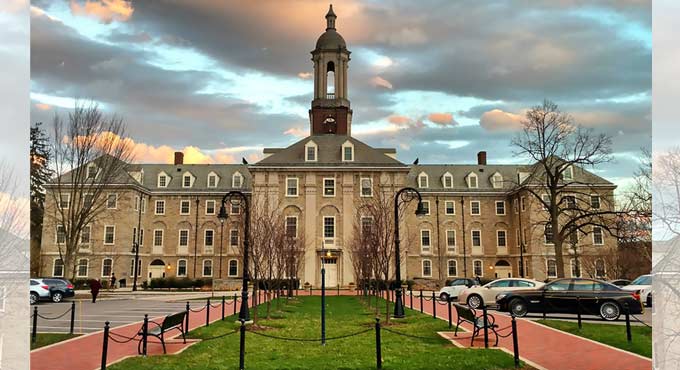Penn State University:Penn State remains among top US, international institutions in impact rankings
Penn State moved up in rankings from fourth to third in the U.S. and remained in the top 50 in the world (No. 47) out of 1,406 international institutions that participated in the 2022 Times Higher Education (THE) University Impact Rankings, placing the University in the top 3% of institutions worldwide.
The THE Impact Ranking is a broad multidimensional assessment of a university’s research, community outreach, and education and campus operations. The criteria used in the assessment are linked to the United Nations’ 17 Sustainable Development Goals (SDGs), global goals adopted by all U.N. member states that look to improve life for all people and protect the planet.
The rankings were far more competitive this year, with almost 1,500 institutions competing — an almost 25% increase from last year — and Penn State’s overall score in THE’s methodology improved from 91.7 to 92.7.
“Progress toward the Sustainable Development Goals has been a ‘whole of university’ effort at Penn State. … I’m particularly pleased to see Penn State recognized for leveraging our partnerships and working together to advance sustainable development.”
Tom Richard, director, Institutes of Energy and the Environment
In addition to being in the top 3% globally overall, Penn State also had strong showings across the individual SDGs. The University ranked third in the U.S. and eighth in the world in SDG 14 (Life Below Water), second in the U.S. and 12th in the world in SDG 11 (Sustainable Cities and Communities), and third in the U.S. and 25th in the world for SDG 15 (Life on Land).
Penn State also had very strong showings in other SDGs, placing in the top 10% worldwide for SDGs 2 (Zero Hunger) and 17 (Partnerships for the Goals).
Penn State’s ranking is due in part to its breadth and depth of exceptional research, including its strength as Pennsylvania’s land-grant and sea-grant university.
“Progress toward the Sustainable Development Goals has been a ‘whole of university’ effort at Penn State,” said Tom Richard, director of the Institutes of Energy and the Environment. “We have organized our research, education, outreach and operations to support sustainable cities and communities, address hunger and inequality, preserve and protect diverse and healthy ecosystems on water and land, and so many of the other goals. I’m particularly pleased to see Penn State recognized for leveraging our partnerships and working together to advance sustainable development.”
The University works to contribute to a healthy, more sustainable planet. For example, Penn State has developed multiple strategies to reduce its energy usage and greenhouse gas emissions. Additionally, the University’s water management programs are led by a conservation program that has reduced its annual water usage by 25%. Other important factors include the University’s stormwater infrastructure, stream bank restoration, source water protection, and the Living Filter, a 600-acre area of land where treated effluent from Penn State’s wastewater treatment plant is applied, then filtered naturally through plants, soil and rocks before it recharges the region’s water table.
“Global sustainability learning is a hallmark of Penn State’s global efforts. We encourage all students to learn the 17 Sustainable Development Goals within a global context while leaving no one behind, through a combination of global thinking and local action.”
Paul Shrivastava, chief sustainability officer and director of the Sustainability Institute
Furthermore, Penn State uses its facilities as a living lab to continuously improve outcomes. The University’s 30 million square feet of facilities provide opportunities for academic enhancement, research partnerships and student engagement.
“Global sustainability learning is a hallmark of Penn State’s global efforts,” said Paul Shrivastava, chief sustainability officer and director of the Sustainability Institute. “We encourage all students to learn the 17 Sustainable Development Goals within a global context while leaving no one behind, through a combination of global thinking and local action.”
Another key facet in Penn State’s ranking was its core missions of service and engagement. This includes outreach through local facilities, such as The Arboretum at Penn State, Millbrook Marsh Nature Center, the Student Farm at Penn State, and Shaver’s Creek Environmental Center.
“This ranking confirms that Penn State continues to honor our values and mission as an exceptional and globally engaged land-grant university. … I congratulate the faculty, staff and students for these critically important and continuing efforts.”
Roger Brindley, vice provost for Penn State Global
The rankings were announced at the Times Higher Education Innovation and Impact Summit in Stockholm, Sweden. The four-day event saw leaders and administrators from around the world come together around the theme of “What makes a successful innovation climate?”
“This ranking confirms that Penn State continues to honor our values and mission as an exceptional and globally engaged land-grant university. Our faculty are committed to applied outcomes that result in positive impacts for society in Pennsylvania, across the United States, and around the world,” observed Roger Brindley, vice provost for Penn State Global. “In addition, we bring experiential learning and community-based teaching to our classrooms as we seek to ensure all Penn State graduates are globally aware and ready to be the next generation of leaders. I congratulate the faculty, staff and students for these critically important and continuing efforts.”

